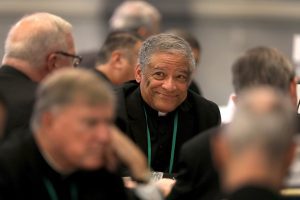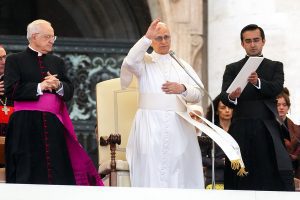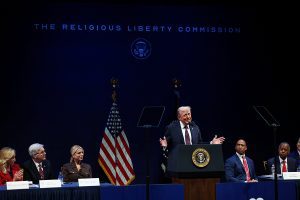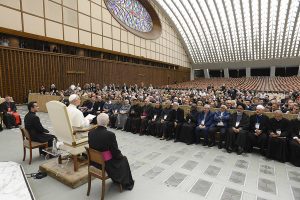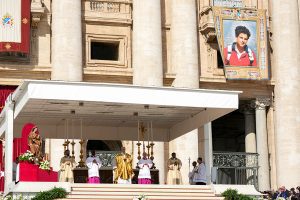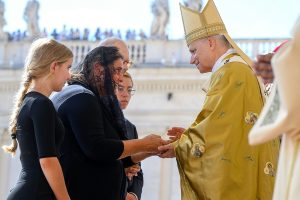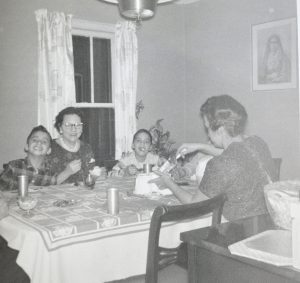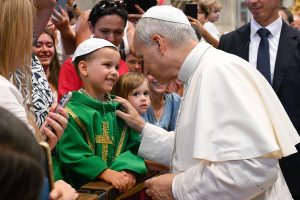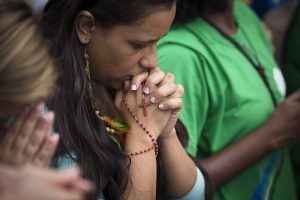(OSV News) – Catholic bishops and public officials are calling for prayer following the apparent assassination of conservative activist Charlie Kirk, who died after being shot Sept. 10 during an event at Utah Valley University in Orem, Utah.
Kirk was 31 and a married father with two young children. He was shot in the neck, reportedly by a sniper from a campus building. The suspect is still at large, and a manhunt is underway, according to law enforcement officials.
In a statement, President Donald Trump said, “The Great, and even Legendary, Charlie Kirk, is dead.”
“No one understood or had the Heart of the Youth in the United States of America better than Charlie,” Trump said. “He was loved and admired by ALL, especially me, and now, he is no longer with us. Melania and my Sympathies go out to his beautiful wife Erika, and family. Charlie, we love you!”

Utah Gov. Spencer Cox, R, called the shooting a “political assassination.”
“To whoever did this, we will find you,” Gov. Spencer Cox said at a press conference.
A staunch ally of Trump, Kirk was the founder of the Republican-aligned Turning Point USA. He was being hosted by that organization’s chapter at the university for his “American Comeback Tour.”
According to multiple reports, Kirk was in the midst of discussing mass shootings in the U.S. with an individual attendee when a single shot rang out, striking Kirk and scattering the crowd.
Bishop Oscar A. Solis of Salt Lake City said in a statement shared with OSV News, “My heart goes out to the family of Charlie Kirk, who was shot and killed today at Utah Valley University.”
“I will pray for the repose of his soul,” Bishop Solis said. “I am also praying for all who were affected, especially those who were present at the event on campus, the many people who admired Mr. Kirk, and most particularly his family. Meanwhile, I continue to pray for all the victims of gun violence throughout the years and their families.”
“It is appalling that senseless acts of violence such as this continue to occur,” he said. “It seems that our society has lost the sense of the sanctity of life, and I pray that our government will undertake appropriate measures to stop these horrible crimes.”
Vice President JD Vance and Gov. Gavin Newsom, D-Calif., both Catholics, were among the first officials across the aisle who offered their reactions on social media, calling for prayer and condemning political violence, respectively.
“Dear God, protect Charlie in his darkest hour,” Vance wrote prior to confirmation of Kirk’s death by the president.
Newsom called the shooting “disgusting, vile, and reprehensible.”
“In the United States of America, we must reject political violence in EVERY form,” Newsom wrote.
Newsom and Kirk previously joined each other’s podcasts to debate their political differences.
Former President Joe Biden, also Catholic, wrote on X, “There is no place in our country for this kind of violence. It must end now.”
“Jill and I are praying for Charlie Kirk’s family and loved ones,” he said.
Former Rep. Gabrielle Giffords, D-Ariz., who survived after she was shot and gravely injured in 2011, wrote on X, “I’m horrified to hear that Charlie Kirk was shot at an event in Utah.”
“Democratic societies will always have political disagreements, but we must never allow America to become a country that confronts those disagreements with violence,” she said.
At the press conference, Cox said Kirk was known for debates on college campuses, and that debate is “foundational to the formation of our country, to our most basic constitutional rights.”
“And when someone takes the life of a person because of their ideas or their ideals, then that very constitutional foundation is threatened,” Cox said.
Kristan Hawkins, president of Students for Life of America and Students for Life Action and a Catholic, said in a statement she was speaking at her own campus tour at the University of Montana at the time of the incident and stopped it to pray in response to hearing the news.
“As I also stood on a college campus, I was horrified to learn that my friend Charlie Kirk had been shot,” Hawkins said. “Our nation is in crisis when speaking up for preborn children and for love of country leads to violence, and that’s clearly on the rise.”
Bishop Robert E. Barron of Winona-Rochester, Minnesota, was also among those who called for prayer.
Trump directed flags to be flown at half-staff as “a mark of respect for the memory of Charlie Kirk.”
The U.S. House of Representatives observed a moment of silence in response.
In a statement confirming Kirk’s death, his organization Turning Point USA said, “It is with a heavy heart that we confirm that Charles James Kirk has been murdered by a gunshot that took place during Turning Point USA’s ‘The American Comeback Tour’ campus event at Utah Valley University on September 10, 2025.”
“May he be received into the merciful arms of our loving Savior, who suffered and died for Charlie,” the statement said. “We ask that everyone keep his family and loved ones in your prayers. We ask that you please respect their privacy and dignity at this time.”

